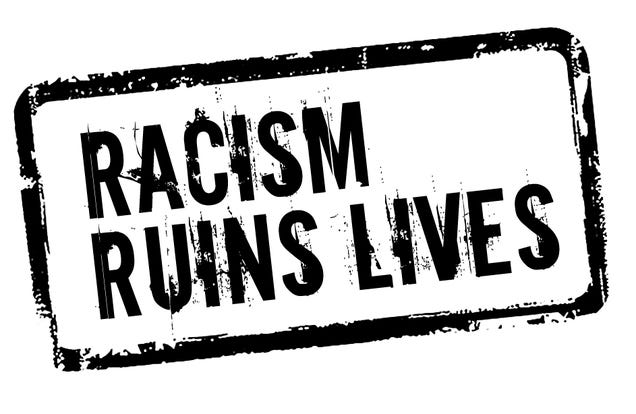For over a decade I have consistently declined to participate in conversations about "race" or "racism." In 2003, I watched the compelling PBS series "RACE: The Power of an Illusion" and was inspired to design a workshop entitled "Final Conversations on Race in America." The creators of the series were diligent and provided a wealth of supplemental teaching and research resources, available free from their website. The film and those resources provided the primary thematic content of my workshop.
A lot of people took issue with the workshop title. "Final conversations?! Race is still a huge problem," I heard from people of all colors. "It's naive/callous/arrogant/insulting/premature/etc. to think it's time to stop talking about it."
Sometimes, in response, I would explain that the title reflected my exhaustion with conversations about race. Yes, I agreed, there is something to be talked about but it isn't "race." Yes, it's a cultural thing but not a culture based on human ethnicity or skin color.
The workshop sought to expose people to the irrefutable science disavowing the existence of the thing we've been talking about for over a century; to allow space and time to process what might have been new information for some participants; to support integration of the ideas with facilitated dialogue and theatre games; and, to encourage participants toward continued contemplation and activism in their day-to-day lives based on insights gained during the workshop.
Today, the video at the head of this post appeared in my FB news feed. I watched it and a light went on in my head: Yes!!! We keep talking about "race" when what we need to talk about and act upon is "racism." Conversations about race miss the point. "Race" is an illusion; "racism" is the rampant, voracious cancer responsible for the corrosive malaise gripping the American psyche. Talking about "race" is talking around the edges, talking in circles at the periphery of the real problem.
All my life I've heard black people, some but not all of them oppressed and suffering, talk about "how white people are." Earlier in my adult life I endured queries by white people, most with good intentions, about why "black people are so...." this or that. Everybody talking about race, framing their comments and questions inside an assumption that we are different from each other as people, accepting as a given that "race" defines some fundamental, measurable, immutable difference.
It is and always was a flawed, and hence, irrelevant, premise.
I think I knew this unconsciously back when I was designing the workshop. I was exhausted with race talk because it never went anywhere, never produced any results, and never solved any problems. Things were the same after every workshop, sermon, seminar, keynote address, retreat and training.
Then Barack Obama was elected President. Race talk had always been tense, delicate work. I think now that underlying and unaddressed issues contributed to the trickiness of those discussions. Sort of like when there's an elephant in the room that everyone agrees to ignore except that the elephant in this case is the systemic racism the entire nation bumps into and dances with every day. We had been talking about race, skin color, black culture and white culture for decades and then boom! a "black" man and his "black" family were living in the "White" House. The sound of mental constructs shattering across the country was deafening.
The existence of President Barack Obama disrupted the flow of the race talk. The simplistic contexts for conversations about monolithic "white" people and "black" people were undone: there had never been valid bases for these conversations but we'd agreed to pretend there were. Not willfully, really; it is the nature of illusion to pervade perception and cloak alternative ways of seeing.
But the dissonance between reality/truth and illusion increased as time went on. Some people broke along that fault line. Their "true colors" began to show after years of being socially shamed into suppressing race bigotry or blatant, ostentatious exploitation of privilege. From politicians to plain
folk, they became bold and vocal and shameless: unarmed black people were shot in the streets, black churches were torched, the President and his family were regularly disrespected, threatened and maligned. Elected officials resorted to acts of treason against the country and disregard for their constituencies. Mayhem!
 Throughout the years of the Obama administration, people of conscience have sought to shame the hooligans back into silence with public accusations of "racism." Years of talk about race and racism had at least managed to establish a fairly universal agreement that it's bad to be called a racist.
Throughout the years of the Obama administration, people of conscience have sought to shame the hooligans back into silence with public accusations of "racism." Years of talk about race and racism had at least managed to establish a fairly universal agreement that it's bad to be called a racist.But something was wrong. The shaming wasn't working any more. In some cases, the accusations only stirred the accused to more vociferous expressions of bigotry as they sought to defend themselves against the accusations.
One had to wonder: How could such ignorance and hatred persist in the land of the free and the home of brave? We have a Constitution. We have well-meaning white people. We've been talking earnestly about race for a long time. How can things be so awful?
Race-based ignorance and hatred is a mental illness. It thrives on 1) failure, through inability or unwillingness, to diagnose and treat it; and 2) denial of the systemic supports that nurture and sustain the illness. Bipolar disorder, manic depression, schizophrenia, male erectile disorder...all acknowledged as mental disorders and energetically attacked with education campaigns, vigorous drug and psycho-social therapies, and well-funded pharmaceutical research.
But not, yet, racism.
Civil rights activism and legislative reform notwithstanding, we have not yet fully acknowledged the systemic nature of racism in the USA. Because conversations about "race" (the Illusion) continue to haunt and color conversations about racism, these discussions are still highly emotional encounters and, consequently, often and easily devolve into non-productive, circular discourse. Everybody takes everything personally.
We are all personally impacted by racism, yes. Racism is a contagion, coursing through the nation, a disease unchecked. It's like cancer in the way it adapts to its host: it can thrive in school cells or church cells or the cells of financial institutions or governmental bodies. It's like herpes in the way it can lie dormant or flare up without completely debilitating the carrier.
One of the most striking points Laci makes in the video is that we've been "sick" with this disease for centuries. It will not be eradicated quickly.
But it will not be eradicated at all without our calling it what it is, acknowledging it is a sickness and deciding to treat it aggressively and relentlessly. There must be a national consensus that we want to get well. And we will each have to get over ourselves and let go of personal sensitivities.
The cure will require more than individual actions like inviting black people to your white church; more than passing desegregation legislation; more than affirmative action and Black Studies courses in our universities. It is about how many people of a certain color are in any given room or neighborhood or prison cell AND it is about more than that. It is about stereotyping and discrimination and prejudice wherever any of these occur AND it is about more than that.
Electing a "black" President did not eradicate racism. In a way, it only poked a hole in the thin containment seal formed by decades of race talk. And I suppose that's a good thing -- or it will be if it leads to transformation at the deepest levels of the American psyche. If we are awakened to the magnitude of the problem and see the way a hallucination has become the paradigm that has created and sustained a systemic web of racism,
if we are moved to bring a diligence on a par with the spirit of the "war on drugs" to the Remaking of America, then the suffering of the last few years will have been of some value.
As with so much that I rail against here at Sojourner in the 21st Century, the outcome remains to be seen.

